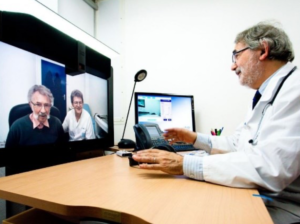#2 – Telemedicine & Law: Recommendations and best practices
Basic information about medical tele-consultations. The covid-19 epidemics that the population is facing requires remote solutions, especially for medical queries, triage in emergencies and limited available doctors to answer questions and reassure the population according to the symptoms described. Here are some answers for the use of telemedicine by healthcare professionals (HCPs).

This Friday 13 March 2020, the Federal Council decided in its Ordinance 2 to ban in-person teaching in schools on the basis of the Federal Act on Epidemics (FAE). On 16 March, it revised its Ordinance and used its power under the Act to impose measures at a federal level describing the epidemic as an extraordinary situation to impose measures to the entire country (Art. 7 FAE). The economy seems paralysed, teachers are deploying e-Learning solutions, families have looking for childcare solutions, employers have to deal with flexibility and pragmatism. Healthcare professionals (HCP) and healthcare institutions (HCO) are on the warpath to guarantee sufficient health coverage and must cope with the increase in cases. Telemedicine can be a response to the #Covid-19 epidemic as a complementary tool to traditional medicine, in particular for acting as filters for detecting symptoms in case of doubts. However, telemedicine requires some basic precautions, both from a scientific point of view and in terms of technical and computer organisation. See our recommendations in this episode #2 of our legal mini-series on Covid-19.
Q.1 Is there a specific law that regulates telemedicine in Switzerland ?
A.1: No. Swiss law does not regulate remote healthcare specifically. Usual rules of medical law and professional guidelines and the main principles apply: civil (Civil and Obligation Codes), administrative (Federal or cantonal laws) and criminal (Criminal Code) law continue to apply. However, we have to apply those principles and interpret Swiss legislation and case law in a particular context; in the light of healthcare provided remotely. This requires taking into account the characteristics and limitations of telemedicine: less senses (smell), no physical (anamnesis without auscultation or palpation) or visual contact (telephone), poor video or sound quality, limited emotional reactions, even with good video quality, limited field of expression.
Q.2 What are the different telemedicine acts and who can practice them?
A.2.1: The most common act is teleconsultation. The meeting can be a simultaneous (telephone) or delayed (e-mail, instant messaging), which consists of advising a patient, prescribing medication or carrying out a medical history and diagnosis remotely.
R.2.2 Only doctors who are authorised to practise medicine in a Swiss canton may practise telemedicine. Such right extends to medical assistants and nursing staff, whether in the office or in hospital, directly instructed and supervised, and who are acting under the full responsibility of the doctor. The same principle applies to telemedicine companies. For those organizations, only authorized doctors or trained personnel acting under their responsibility of the doctor may practice outpatient or home care healthcare services. At least one year of practice is recommended
Q.3 Are remote care services covered by health insurances?
A.3: Generally speaking, yes. Health care services must meet three criteria. When providing remote care, we can presume that they are appropriate, effective and economical (art. 32 Federal Act on Health Insurance), unless one can demonstrate otherwise. In the context of a pandemic, such as the coronavirus, these criteria will most likely be met. An insurance may also reimburse teleconsultations that a doctor provide to a patient located abroad, particularly in view of the flight restrictions and the closing of borders. The Tarmed positions (AF.10 for the future Tardoc) take into account medical teleconsultations for basic and cumulative healthcare services.
A.4 How to respect best medical standard practices in a pandemic situation?
R.4: Respecting best medical standard and professional practices means that doctors must use the same diligence and care for in-person consultations. In case of doubt, or if the circumstances require it, an HCP will have to redirect the patient for a consultation or to the nearest hospital. This is mandatory if the teleconsultation alone does not guarantee a treatment with the same quality as in the doctor’s office. In the context of the Covid-19 epidemic, scientific knowledge is evolving very rapidly and the population is facing false information circulating via social media, which they may take for granted. The “tele-physician” can play a major role in ensuring effective triage of medical cases and refer or not patients to hospitals in order to avoid overloading them. In the context of an epidemic, the primary care physicians will rely on the most up-to-date scientific knowledge relating to Covid-19 coming from international guidelines, scientific literature, FOPH and cantonal doctors.
Q.5 How to effectively protect medical secrecy and patient personal data of patients?
A.5: Telemedicine often involves new technologies and doctors must guarantee medical secrecy and the protection of personal data. Health-related or patient data is considered sensitive data and requires special protection. The CNIL issued a decree to facilitate access to telemedicine without going to a doctor’s office with rules to protect patient data. Two key data privacy principles: (1) collect only what’s necessary for your purpose (data minization); (2) delete patient data after the epidemic.
In Switzerland, the Federal Data Protection Commissioner (FDPIC) provided his opinion on Covid-19 and some advice on data privacy in the context of medical practice, its security, the risks of using patient data in the cloud, a comprehensive guide on keeping medical records and medical secrecy. Violation of medical secrecy is punishable by criminal sanctions (Article 321 of the Swiss Penal Code). Transmission of medical information to a colleague or the consultation of a previous episode of care requires the consent of the patient. In the event of a risk to public health, a public or private interest may override the right to patient’s privacy and allow a lawful processing to preserve vital interests (we will discuss data privacy separately). Finally, only physicians should collect detailed health data.
Q.6 What recommendations using new technologies by doctors?
A.6: Patient data storage outside the doctor’s office (mobile device): Extract patient data, include it in the medical record, delete it from the device to prevent loss or unlawful access. Third parties service providers (IT) cannot guarantee nor protect medical secrecy. Encrypt attachments, use secured e-mail clients and connexions (VPN), keep data in Switzerland and avoid using cloud.


